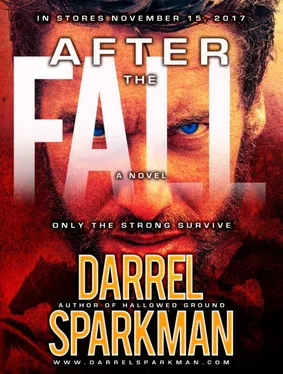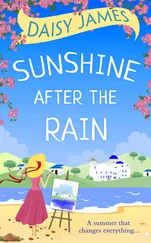The man walked around flexing his muscles, putting on a show of loosening up, preening and showing off before his next kill. Who was he showing off for? That worried him a lot. The man had crazy eyes, but didn’t stop watching Trent’s throwing arm that held the knife. Seeing the rippling muscles and quick feet, he knew he could not match this man on strength alone. He didn’t intend to try.
“You’re pretty good.” The raider nodded at him. “You took care of them three boys real fast, but don’t you get your hopes up. I’m better than them. I’ve killed lots of men better than you, and I’m going to gut you like a pig. You afraid of dying, boy?”
He smiled. “You going to talk me to death?”
The smile faded from the man’s face. Cold eyes contemplated him for a moment before he replied. “No, boy. I’ll use this.” He raised his wide-bladed knife toward Trent.
With a shout he lunged forward, the point of his knife held forward like a spear, hoping to impale Trent before he was set. Trent faded to one side, narrowly evading the lunge, but the move kept him close enough for his blade to flick out and nick the man’s arm.
Blood welled from the small cut and the raider sneered. “You’ll have to do better than that, boy.”
Furiously, the man attacked him with broad sweeps and furious lunges, and the small clearing came alive with the sound of steel clashing against steel. Both men were breathing heavily and, as if by common consent, they stood apart a moment. He stood calm as he watched the man before him, a man whose arms and shoulders dripped with blood—a man who tired because of what he considered insignificant blood loss.
Trent glanced cautiously from side to side. The encounter was taking too long. Every second he stayed in this place increased his danger. He needed to end this quickly.
With a curse, the raider renewed his attack, sweeping wide and slow with his blade and giving Trent the opportunity he needed. Slapping the knife aside with his free hand, he came in under the outstretched arm and buried his knife in the belly of the bigger man. He pulled the blade up and over in a figure seven. Then, placing his left hand on the man’s chest, pushed him away. It was short and brutal, leaving no chance for retaliation.
The man went backward and sat on the ground, vainly trying to hold his stomach together. He looked at Trent with shocked eyes as his heart pumped his life away through his fingers. The big raider tried to say something, but ran out of time. He fell gently sideways into the leaves, his final breath leaving in a long sigh rustling the grass by his mouth.
Panting heavily, Trent quickly looked around him, while retrieving the revolver and wiping dirt and leaves from the action. A flicker of movement, away in the trees, drew his momentary attention. He froze, watching and listening. Nothing. Slipping his gun into its holster, he mounted the gelding, pulling the rifle from its boot as he settled in the saddle.
The encounter left him unhurt, except for the shallow cut on his side. He glanced back at the dead men. Some might think him lucky, but he knew it was far more than that. He’d read about the ancient Berserkers who went wild in battle, bare-chested when others wore armor. This same anger came to him, even as a child, fighting with pointed sticks. Those sticks hurt, and more often than not, he would lash out in a burst of fury unleashed by a stinging wound from an opponent. Sometimes people called this fury bravery, but he could never accept that. Anyone who wasn’t scared in a fight was a fool.
He looked at the men who attacked him. Young, dirty, and getting no older. Looking at the youngest boy, he felt a wave of sadness wash over him. Even the young ones caught the raiding frenzy. He’d killed many times in the past, though never by choice. Always, the young ones bothered him the most.
With most of the country returned to a virgin wilderness, no one seemed to want to put out the effort to settle it again and restore some kind of order. He reasoned people could find something better to do with their time than prey on fellow survivors. But after the collapse of civilization, the killing and fighting had become a way of life.
When would it end?
He looked around the clearing one last time and felt tired. The one thing he wanted most from life was peace and quiet. With a sudden burst of clarity, he knew neither was likely.
He was in the wrong business.
The man standing at the window was so large he blotted out the incoming sunlight—his mottled black and green uniform severely pressed, the creases straight and sharp. Adorning his shoulders, the silver eagles of a colonel in the United States Army glittered in the light.
His unfocused gaze lingered on the street below, noting nothing in particular, but acutely aware of all. It was a ritual for him. Always hoping for change and never finding any.
The street below appeared to be controlled confusion at best. It was busy at this time of day, choked with horses, wagons, and an occasional motored vehicle whose type and looks were limited only by their owner’s imagination.
As usual, his thoughts turned to The Fall. When the end came, it was so damned easy and predictable. The American people just would not believe it was happening. Europe, sure, they are fighting all the time anyway. China, maybe so, with the billions of people they have—but not to us. Not to the good old U. S. of A. It started out like a bad sci-fi movie. The economy was a bust, businesses folding up by the thousands. The value of the dollar was dropping like a rock, and Congress didn’t have a clue. Not one damned clue. They were so anal retentive, the whole bunch looked like a chocolate donut.
Every country in the world got mad at somebody. Europe, Africa, Asia, South America, and troops were sent to all of them. Trying to police the world. What a waste.
Hearing his adjutant enter, the colonel finally turned from the window, “Jesus, Fred. Stop waving that paper around. I give up. I surrender. What is it? My discharge?”
The adjutant’s gaze held the colonel’s for a moment, ignoring the old joke usually resulting in a laugh. Where would they go?
“We got this by courier. There have been fresh outbreaks of plague back East. They say a lot of the water is bad. The whole thing may be starting over again, at least among all the people who drifted back to the big cities.”
“Oh, that’s just wonderful.” The colonel glared at the adjutant as he stomped toward a map on the wall. “I’m really glad you shared that with me, Fred.”
“Sir, the dispatch says the GDCC is working on a vaccine.”
“Right, the Government Disease Control Center.” His voice was sarcastic. “With what , for chrissake? There haven’t been any pharmaceuticals manufactured here in the States in twenty years. What are they going to do, throw sticks at it? Bring in some witch doctor and scare it away? Cut open a chicken and look at the entrails? The scientific community never solved it twenty years ago, and they won’t now.”
“Look at this map, Lieutenant. This Ozark Project has to work. It may be our last hope. We’re sitting right by one of the few safe areas left in the United States.”
A pointer appeared magically in his hand, and he began to lecture his adjutant. “Do you see this section of the Mark Twain National Forest? It’s a wilderness in there. Mountains and hills covered with forest and grass. The water is clear and cold and the hills are full of all the game you want. Some settlements even have their own electricity. They run it from old gristmills on the rivers. It’s just sitting there, ready and waiting for us. It’s the best chance for our people to survive and start again. Over the last year, we’ve been gathering some of the best people we can find—the best minds, people with the talent to rebuild. We’ve got at least fifty families that we can put in there.”
Читать дальше












